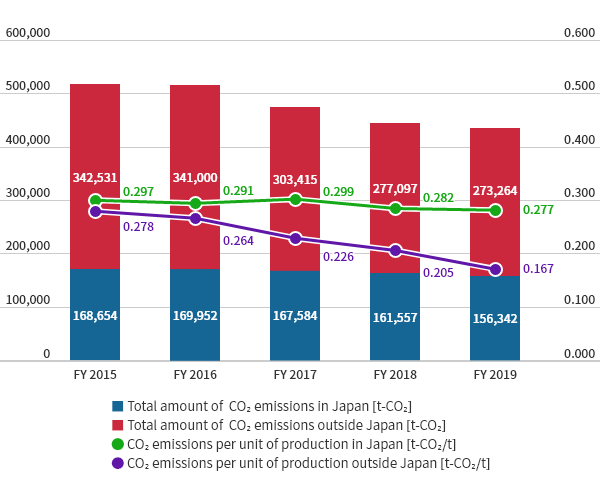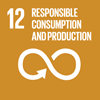CO2 Emissions Reduction
Focus SDGs
Management information
Relation between themes and business activities
In recent years, global issues such as climate change have become increasingly severe, affecting people's lives and companies' business activities. As a food material manufacturer, the Fuji Oil Group uses energy not only for plant operations but also in all its value chain processes, including the procurement and transportation of raw materials.
Basic approach
As a member of society, the Fuji Oil Group supports a sustainable society as advocated by the United Nations through the SDGs, and will seek not only to create economic value, but also to engage in business activities while taking the global environment into consideration. Based on our Basic Policy of Environmental Integrity,* the Environmental Vision 2030*2 shows our commitment to the reduction of CO2 emissions. As specific emission reduction targets, we have set Science Based Targets (hereinafter, “SBT”*3). We will further reduce CO2 emissions through further energy-saving activities at the production sites, by the introduction of energy-efficient equipment and by the use of renewable energy.
* Refer to the URL below for details on the Basic Policy of Environmental Integrity.
https://www.fujioilholdings.com/en/about/policy/
*2 Refer to the URL below for details on the Environmental Vision 2030.
https://www.fujioilholdings.com/en/csr/environment/management/
*3 SBT: 5-to-15-year GHG emission reduction targets that a company sets in line with the standards defined by the Paris Agreement (holding the increase in the global average temperature to well below 2°C above pre-industrial levels and pursuing efforts to limit the temperature increase to 1.5°C above pre-industrial levels)
Promotion system
We promote our initiatives to reduce CO2 emissions under the supervision of the Chief “ESG” Officer (C“ESG”O). Moreover, the ESG Committee*, which is an advisory body to the Board of Directors, confirms the progress and results of these initiatives as a priority theme for ESG management.
* Refer to the URL below for details of the ESG Committee.
https://www.fujioilholdings.com/en/csr/approach/
Objectives / Results
2030 targets
Our target is to reduce Scope 1 and Scope 2 emissions* by 40% and Scope 3 (Category 1) emissions* by 18% by 2030. (Base year: 2016)
*Scope 1 emissions: Direct emissions from owned or controlled sources
*Scope 2 emissions: Indirect emissions from the generation of acquired and consumed electricity, steam, heat and cooling
*Scope 3 emissions: Indirect emissions (not included in Scope 2) that occur in the value chain of the reporting company (Categories 1 to 15)
*Category 1: Emissions from purchased goods and services
Progress toward 2030 targets
In FY 2019, the Fuji Oil Group’s overall production increased significantly because of the addition of Blommer Chocolate Company (U.S.) to the Group. Nevertheless, Group companies’ energy-saving activities, introduction of renewable energy and other efforts enabled the Group to reduce its total CO2 emissions to 429,606 t-CO2 in FY 2019, down by 2% (9,048 t-CO2) year on year and by 16% (81,345 t-CO2) from the base year.
FY 2019 objectives
- Setting revised targets that meet new requirements for SBT approval
- Establishing optimal methods of collecting and analyzing CO2 emissions data and disclosing accurate information
FY 2019 results
In 2018, Fuji Oil Holdings Inc. submitted a commitment letter to the SBTi,* and in March 2020 the SBTi approved the CO2 emission reduction targets set for Fuji Oil Group companies inside and outside Japan. Among the approved targets, the Scope 3 targets were set based on the primary data on Scope 3 emissions, which we collected and analyzed for the first time to monitor CO2 emissions from our entire supply chain. We are currently assessing a data collection system that will help streamline the data collection process. The new system will be introduced in FY 2020.
* SBTi: Science Based Targets initiative, a joint initiative undertaken by the World Resources Institute (WRI) and the United Nations Global Compact to encourage companies to set science-based GHG emissions reduction targets with the aim of holding the climate change-caused increase in the global average temperature to well below 2°C above pre-industrial levels
Total amount of CO2 emissions (Scopes 1 & 2) and CO2 emissions per unit of production

Next Step
We will continue our activities to fulfill the Environmental Vision 2030, including promoting energy-saving activities at production sites, introducing energy-efficient equipment, and using renewable energy. We will also increase the accuracy of our Scope 3 emissions data and assess effective ways of reducing Category 1 emissions, which are the largest among all emission categories including internal carbon pricing, in order to reduce CO2 emissions across the Fuji Oil Group. In FY 2020, we will promote activities that help reduce CO2 emissions and achieve SBT approved targets, including in-house training activities.
Specific initiatives
Enhancing the energy efficiency of production equipment
Below are examples of the initiatives that we implemented in FY 2019 to enhance energy efficiency.
- Cutting energy consumption at three oil-and-fats and whipping cream plants at the Fuji Oil Co., Ltd. Hannan Business Operations Complex by replacing old equipment, introducing LED lights for outdoor use and other means (resulting in an annual reduction of approximately 919.9 t-CO2)
- Installing equipment that recovers the heat of hot water used for deodorization and cooling at the Fuji Oil Co., Ltd. Chiba Plant (resulting in an annual reduction of approximately 356 t-CO2)
- Introducing solar power generation at the Fuji Oil Co., Ltd. Rinku Plant and Fuji Oil Europe (Belgium)
- Beginning to replace old lights with LED lights at Palmaju Edible Oil Sdn. Bhd. (Malaysia), Harald (Brazil) and Pt. Freyabadi Indotama (Indonesia)
Introducing renewable energy
To fulfill the Environmental Vision 2030, the Fuji Oil Group plans to introduce renewable energy. In 2016 the Fuji Oil Tsukuba Research and Development Center installed solar panels. Since then part of the electricity used by the Center is generated by solar power. Solar panels were also installed at the Fuji Oil Co., Ltd. Rinku Plant in February 2020 and at Fuji Oil Europe (Belgium) in June 2019. These are currently in operation. Furthermore, Fuji Oil Holdings Inc. office in Osaka uses green power, that is, electricity generated in environment-friendly ways. Our purchase of a Japanese version of a Renewable Energy Certificate will enable us to reduce our CO2 emissions by approximately 43t-CO2 in FY 2020 by using solar power generated in Kochi Prefecture.

